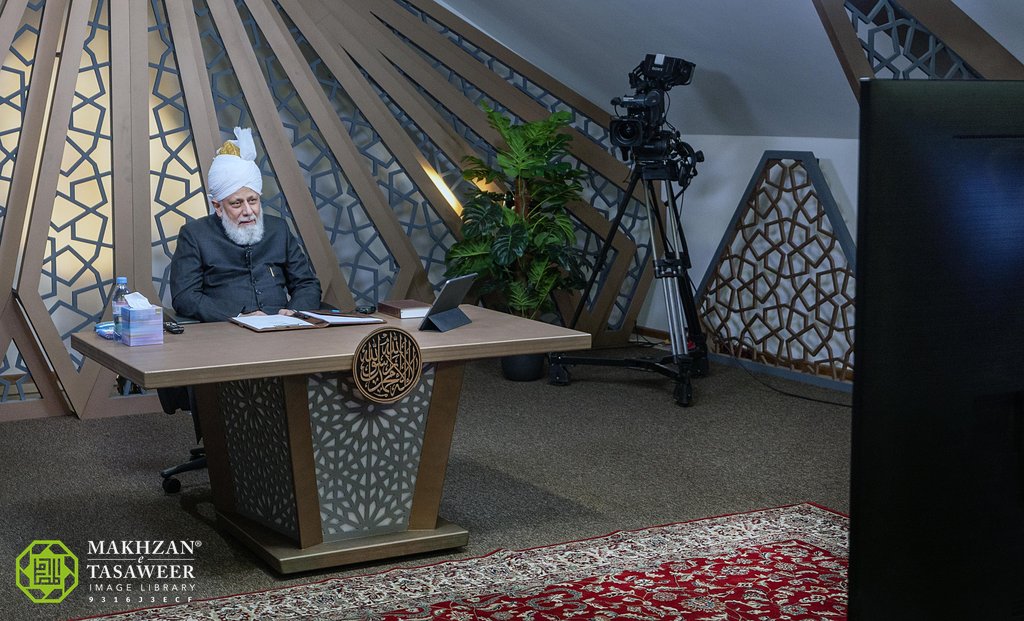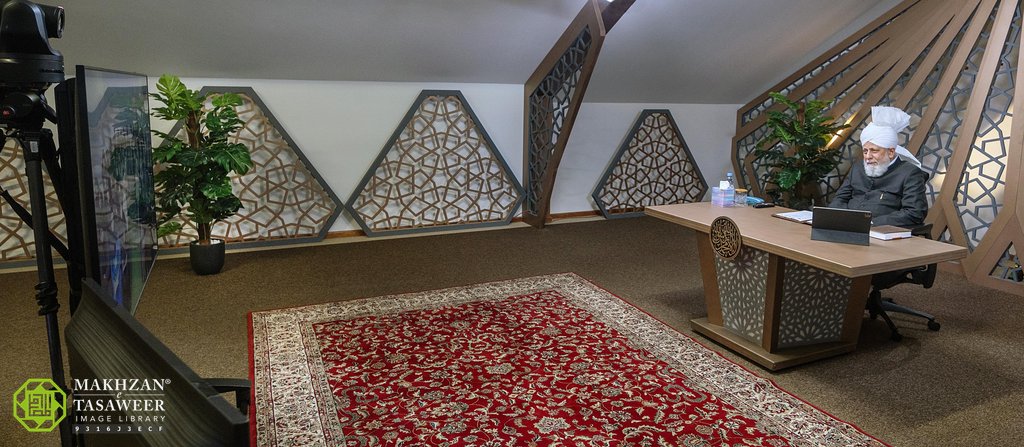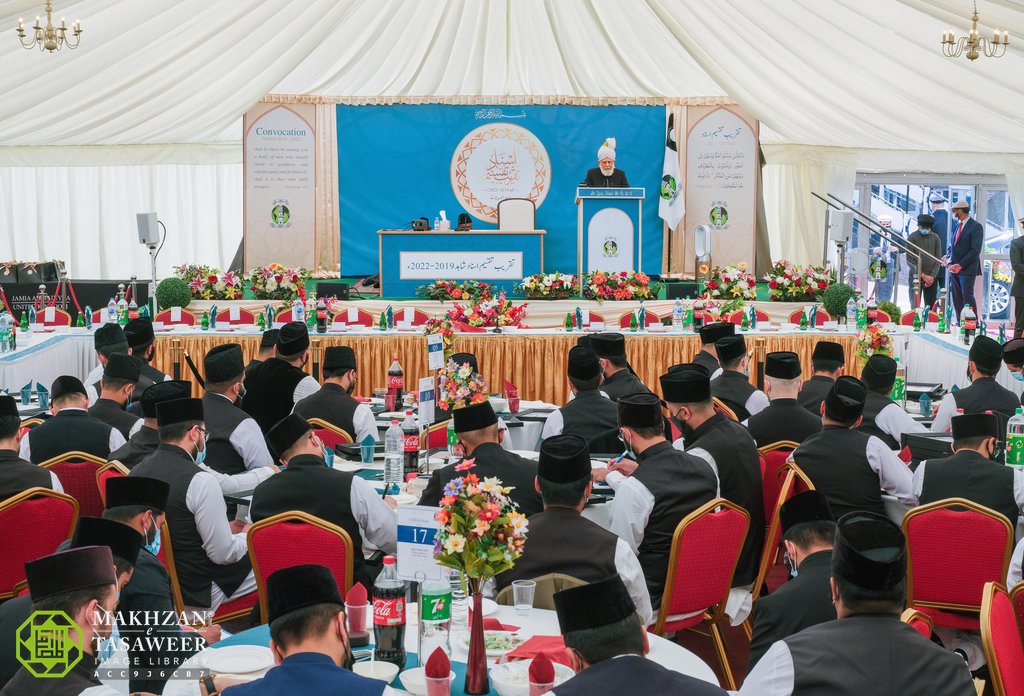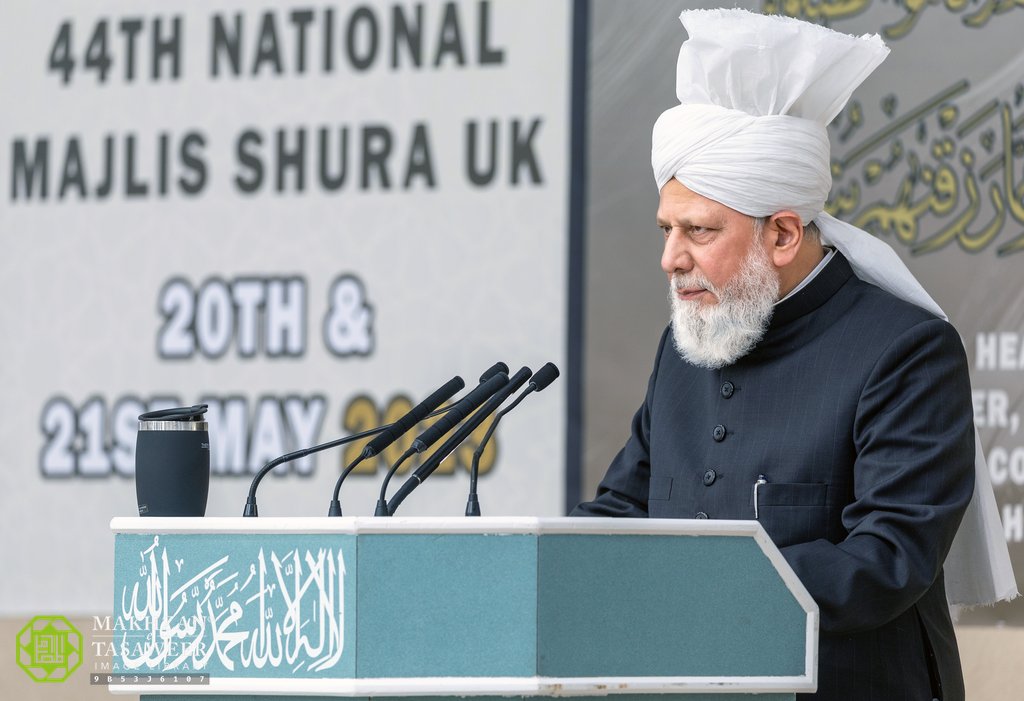
Lajna Members from Italy have Honour of a Virtual Meeting with Head of the Ahmadiyya Muslim Community
“When the Khalifa of the time is made aware of the good works you do, he is filled with joy” – Hazrat Mirza Masroor Ahmad
On 14 May 2023, the World Head of the Ahmadiyya Muslim Community, the Fifth Khalifa (Caliph), His Holiness Hazrat Mirza Masroor Ahmad held a virtual online meeting with members of Lajna Imaillah Italy (Ahmadiyya Muslim Women’s Auxiliary).
His Holiness presided the meeting from MTA Studios in Islamabad, Tilford, whilst the Amila members joined the meeting virtually from Bait-ul-Tauheed in San Pietro in Casale, Bologna, Italy.
Following a formal session that began with the recitation of the Holy Qur’an, attendees were given the opportunity to ask questions on a range of issues.

One attendee asked his Holiness about the relationship between a husband and wife and how it impacts the children.
Hazrat Mirza Masroor Ahmad said:
“When you get married, then men mostly – and sometimes women as well – they just forget what they promised with the other party. So, you should always realise that now your life is not for your own self; now there is a responsibility of some other lives (one’s children) on your shoulders, and you have to bring them up in a way which is according to the teachings of Islam. And if you are not showing respect to each other, you are not following the teaching of Islam, you are not discharging your duties you owe to Allah the Almighty, you are not following the Commandments of Allah the Almighty, you are not showing good morals, then it will harm your future generation.”
Hazrat Mirza Masroor Ahmad continued:
“Instead of prioritising your own self, you should solve your problems amicably [between a husband and wife] so that your children should also learn a lesson from you that this is how we should behave with each other. [In this way] they will be brought up in a way which is purely the Islamic way… It’s a matter of showing respect to each other. So, if a husband and wife both realise their duties, then it will never happen that they think that they are superior to the other.”
Thereafter, an attendee expressed that she heard that His Holiness mentioned that he visits every country where Ahmadi Muslims reside in his imagination prior to going to sleep and prays for them. She enquired what comes to mind when His Holiness is pondering over Italy.
Hazrat Mirza Masroor Ahmad lovingly responded:
“I pray for Italy like I pray for all others as I visit them. I pray that Allah the Almighty keeps the Ahmadi Muslims of Italy under His Protection, that He guards them from all sorts of distress and that they are able to peacefully go to sleep at night and wake up rejuvenated in the morning. And that they remember Allah the Almighty and become those who excel in good deeds. May Allah the Almighty protect them from all vices. So, there are various prayers that I do and I do so for you too.”
Following this, another attendee sought His Holiness’ advice on serving the community by devoting one’s life to the faith, in spite of not being a member of the Waqf-e-Nau (a scheme of devotion to faith). She asked how she can become a “delight of the eyes” for Khilafat.
His Holiness praised her for her lofty goals and presented a number of examples of those who had served the faith to great extents but were yet not part of the Waqf-e-Nau scheme, such as women who dedicated their lives for the sake of their faith later in life and taught in schools of the Ahmadiyya Muslim Community and took part in other charitable projects in Africa.
His Holiness gave further guidance on fulfilling one’s role as a devotee and urged Lajna members to propagate the faith, adhere to the teachings of the Promised Messiah (peace be upon him), and learn about the Holy Qur’an and the sayings of the Holy Prophet Muhammad (peace and blessings be upon him).
Speaking about what would make the Khalifa of the time happy, Hazrat Mirza Masroor Ahmad said:
“When the Khalifa of the time is made aware of the good works you do, he is filled with joy. As a result, he prays for you and that is indeed what is considered as the ‘delight of the eyes.’”
Another attendee asked His Holiness if it is permissible to have non-Ahmadi friends and if so, how one’s behaviour should be when propagating the message of Islam to them.
Hazrat Mirza Masroor Ahmad responded:
“If you don’t make friends from among non-Muslims, then how will you tell them about the peaceful teachings of Islam? Obviously, you will have to make friends from among non-Muslims and Muslims. And then, if you are a practising Muslim, you are following the teachings of Islam, you are offering your five daily prayers and during discussions you tell them about what the Holy Qur’an says about the rights of women, about the rights of other fellow beings, then this will open the avenues of conveying the message of Islam to them.”
A Lajna member asked His Holiness that if a married couple are getting divorced, should they explain their decision to their children?
Hazrat Mirza Masroor Ahmad responded:
“Children are very clever. They already know that there is a conflict between their mother and father. So, if you take any decision to get divorced then if the children ask you why, then you should explain to them that this is the reason and there is no harm in telling them. They are sensible, they understand. But at the same time, both parents, father and the mother, should tell them that although we are going to get divorced, but it is the commandment of Allah the Almighty that you should behave well towards each of your parents.”
Thereafter, the attendee asked a follow-up question regarding marriage. She enquired whether it is right for a woman to consider herself an equal partner in marriage and mentioned how some men assume superiority over women.
Hazrat Mirza Masroor Ahmad elucidated the matter and said:
“It is quite right that you are equal partners as far as your rights, your freedom and your liberty is concerned. You have equal rights. At the same time, Islam has allocated some assignments to both husband and wife. The husband is responsible for running the household affairs and he should be the breadbasket of the house. If the woman is working, then husband should not say to her, ‘Because you are working, you should also share in the day-to-day expenses in the house as I expend.’ This is the responsibility of the husband. The money a woman earns, if she wants to spend the money on the household, on the children, on the utilities, that is at her own discretion.”
Hazrat Mirza Masroor Ahmad further stated:
“The woman is responsible for keeping her household affairs in line with the teachings of Islam… You should look after your children, train your children in the best way. When they come from school, they should know that their mother is at home, [they should know that], ‘she will receive me, she will welcome me and she will prepare food for me and she will do all those things which are necessary for my upbringing.’ Then if both of you realise their duties – the husband his duties and the wife her duties – then there should not be any conflict. Your household affairs will run smoothly and amicably.”
A Lajna member also asked His Holiness how they can help people who don’t feel comfortable in their gender, including those who resort to gender reassignment surgery.
Hazrat Mirza Masroor Ahmad said:
“Sometimes when a child feels that one of their siblings is being treated in a different way, then sometimes these type of thoughts arise in their minds. Also, sometimes, they are influenced from the outside world, from school atmosphere and sometimes by the lecture the teacher gives to them about gender. So, there is an outside influence on them that affects their sentiments, their emotions, and this is why they try to change their gender. They feel that if we change our gender, in this way we shall be more appreciated and respected. So, this is a psychological matter. If they wish, they should be psychologically evaluated. But nowadays, it is very much difficult. Those who take this decision, when they attain the age of fifteen or sixteen, then they become very much stubborn, and when they have decided that they will remain like this then nobody can do anything. So, we can only pray and advise them.”
Hazrat Mirza Masroor again highlighted the responsibility of parents and said:
“This is the responsibility of parents that they treat their children with respect and give due respect to each of the children from the very childhood and to keep on advising them about the religious teachings.”

